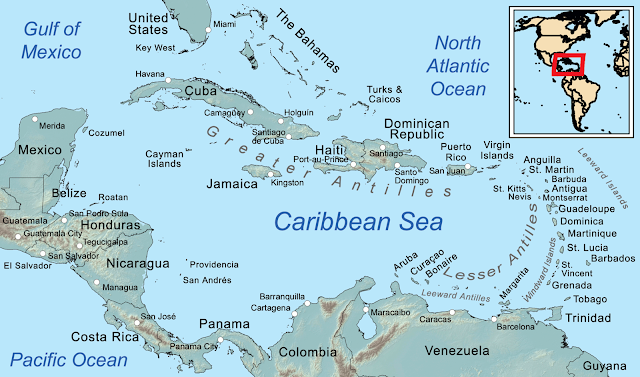The Significance of Caribbean History
Welcome to my first Action Project for my Humanities course, A Nation’s Argument. For this unit, we looked into America's Declaration of Independence and different types of premises. Throughout this unit, we learned how to create an effective argument when using inductive and deductive premises and what the word argument really means. For Field Experiences, we went to Alderman Walter Burnett and sat in on a city council meeting to watch an ordinance being passed or not on legalized marijuana usage in Illinois to get a real taste of what argument is and how it is used in the city we live in. For this Action Project, we were able to declare our independence to create our own syllabus to create a structured independent study as a common course/class. I chose to create a course based on learning about Caribbean history.
With my personal experience, I have noticed that American education is very black and white. There is not much of an in-between or outside to really inform and expose students to other types of history. I want to declare that it is necessary to learn about Caribbean history and the significance it has with our world today. It is necessary for me to write this Declaration because there is a large history that we learn about with missing pieces and questions that haven’t been totally answered involving colonial struggles such as genocide, enslavement, immigration, and rivalry against the Caribbean.
The purpose of schools to learn about Caribbean history is to expose them to other sides, stories, and pasts that haven’t been fully taught. Again, America’s education system, specifical history is majority only black and white. A lot of students have questions and curiosities regarding other minorities that have played a role in the world that we now live in. Caribbean history is also a big connection to America since it plays a big role in colonization and genocide. By learning this it is also a great opportunity for students to spark an interest in Caribbean culture and learn about what Caribbean culture has historically influenced by.
Historical Evidence: "The history of the Caribbean reveals the significant role the region played in the colonial struggles of the European powers since the 15th century. ... Genocide, slavery, immigration, and rivalry between world powers have given Caribbean history an impact disproportionate to its size."
Course Name: The Significance of Caribbean History
My official declaration is that students should be able to learn about Caribbean history. In school, we learn a lot of history specifically based in black and white and not so much of other history and historical events that have taken place. With this declaration, we are able to learn about the significance of Caribbean culture and how it impacted our world today.
With my personal experience, I have noticed that American education is very black and white. There is not much of an in-between or outside to really inform and expose students to other types of history. I want to declare that it is necessary to learn about Caribbean history and the significance it has with our world today. It is necessary for me to write this Declaration because there is a large history that we learn about with missing pieces and questions that haven’t been totally answered involving colonial struggles such as genocide, enslavement, immigration, and rivalry against the Caribbean.
The purpose of schools to learn about Caribbean history is to expose them to other sides, stories, and pasts that haven’t been fully taught. Again, America’s education system, specifical history is majority only black and white. A lot of students have questions and curiosities regarding other minorities that have played a role in the world that we now live in. Caribbean history is also a big connection to America since it plays a big role in colonization and genocide. By learning this it is also a great opportunity for students to spark an interest in Caribbean culture and learn about what Caribbean culture has historically influenced by.
- America’s education system solely focuses on only a specific type of people and not so much of other minorities and their importance/impact.
- Students who are neither white nor black do not get to deeply learn about the history of Caribbeans.
- American education briefly discusses the involvement of genocide and enslavement of Caribbeans, but never really opened up to students about the significance.
- As someone whose ancestors came from the Caribbean I have always wondered what that history looked like and why wasn’t I able to learn about if I was learning about other histories.
 |
| Wiki.MapOfTheCaribbeanSea.2011 |
Course Name: The Significance of Caribbean History
Resources:
- Carribean American Bakery
- The Art Institute of Chicago
- Documentary (https://www.youtube.com/watch?v=0gms3_CQ2sU)
- Piece of text (http://caribya.com/caribbean/history/)
- Piece of text (http://caribya.com/caribbean/history/)
- https://www.artsy.net/article/artsy-editorial-12-artists-caribbean-diaspora-shaping-contemporary-art
Objectives/Hopeful Outcomes:
- Students to become knowledgable and aware of Caribbean History.
- Students to learn more about the past of colonization and genocide.
- Students to learn their history and not question where they come stood.

Comments
Post a Comment